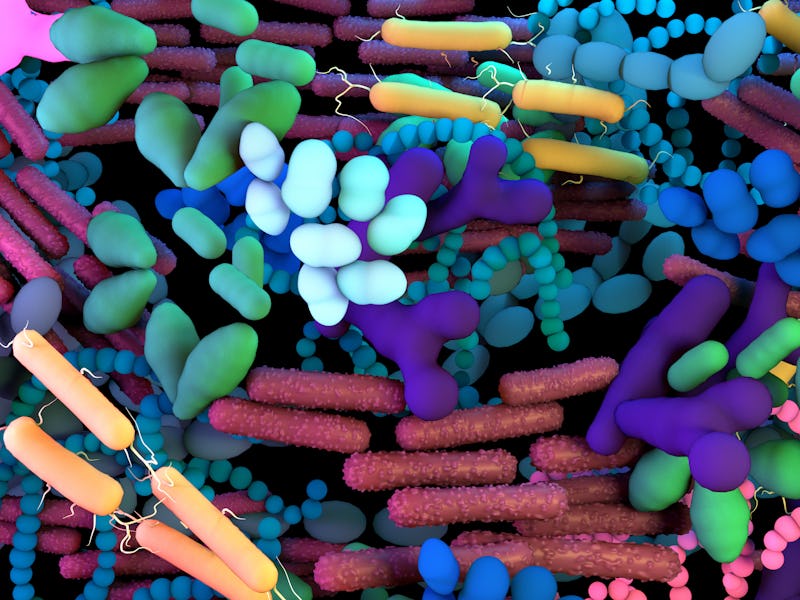The wondrous gut reveals a new link to weight loss
Plus: One of the most frustrating parts of living through a pandemic

I cannot believe I let the 21st of September pass by without a reference to America’s Favorite Wedding song. Still, I can try to make up for it with the latest annual celebration of 9/21 by filmmaker Demi Adejuyigbe (Read more about his story here.)
Short intro today; I’m under the gun on a few exciting new projects from Inverse you should look out for in the weeks and months ahead!
I’m Nick Lucchesi, and this is Inverse Daily. Please share this science & innovation newsletter with a friend by sending them this link.
Now: Onto to the best new, original stories from us. Our headlining story — featured as the final snippet in this daily dispatch — is all about your marvelous gut and how the diversity of bacteria in it can help you lose weight faster. The gut is the perpetual hipster’s choice when it comes to cool-yet-underrated parts of the body, and this new story adds another layer of Kevlar to the microbiome’s bulletproof rep.
This is an adapted version of the Inverse Daily newsletter for Wednesday, September 22, 2021. Subscribe for free and earn rewards for reading every day in your inbox. ✉️
A sci-fi apocalypse movie reveals a real-world threat — Tara Yarlagadda writes about a science-fiction classic that made history when it debuted in 2004. Here's why The Day After Tomorrow is more relevant than ever:
Every good sci-fi disaster movie has a predictable formula.
A scientist raises the alarm about an urgent threat to humanity, politicians ignore them, but once it becomes clear that the danger is real and could wipe out humans, they work together to solve it all.
This formula didn’t just miraculously appear. The movie that cemented it as the way to make a disaster film is arguably the 2004 sci-fi epic The Day After Tomorrow, directed by Roland Emmerich. In the movie, paleoclimatologist Jack Hall (Dennis Quaid) worries that global warming could trigger a critical ocean current to shutdown, dooming humans to a new Ice Age — and New York to apocalyptic storm surges.
More reel science:
- The biggest sci-fi disaster movie of 2022 reveals a real cosmic scenario
- Understand Loki time travel through the actual science of branching universes
- Netflix's best sci-fi thriller of 2021 shows a controversial real technology
The Perseverance rover lands on Mars with the help of its helicopter.
A discovery could change Mars missions — Passant Rabie writes about a new study that suggests that Mars may have been a desert during its past, decreasing the chances of the Red Planet hosting life:
Despite previous evidence that the Red Planet once hosted lakes, rivers, and other possible bodies of water, analysis of Martian meteorites shows that Mars may have had a much drier past than scientists believed.
As NASA’s Perseverance rover scours the Martian terrain to look for clues of ancient microbial life, the recent research could mean that the rover’s search will turn up empty, and our hunt for life beyond Earth may suffer a significant setback.
More about Mars:
- Terraform Mars: After Inspiration4, Elon Musk hints at his long-term goal
- Future colonies on Mars could be made from human blood
- Mars rover makes history and collects rocks for 2030s human retrieval
A psychological trick to get people to follow Covid-19 rules — Katie MacBride reports that when people advocate for Covid-19 safety protocols and remember when they didn't follow them, they're more likely to mask and social distance in the future:
One of the most frustrating parts of living through a pandemic is knowing people aren’t adhering to Covid-19 safety guidelines and recommendations — like wearing a mask in indoor public spaces and getting vaccinated — when research shows such behavior curbs the lethal disease.
With so much at stake — as of September 21, there are more than 200 million infections and 4 million deaths — a pressing question has emerged: How can “anti-makers” and “anti-vaxxers” be convinced to follow expert guidance? These individuals ideologically reject the notion that Covid-19 is a severe threat and refuse to mask, vaccinate, or socially distance on ideological grounds.
More science-based Covid-19 reporting:
- Covid-19 booster shot: Schedule, side-effects, concerns, and usefulness
- Covid-19 booster shots: 8 questions and science-backed answers
- Covid-19 breakthrough infections: 4 reasons some people get them
Does gut health affect weight? A study reveals critical data — Sarah Sloat reports that in a recent study, scientists found the genes and enzymes in your gut influence your likelihood of losing weight:
In your digestive system are trillions of microorganisms. These bacteria, viruses, and fungi are collectively known as the microbiome.
Scientists are increasingly aware of the microbiome’s critical role in influencing physical and mental health. Now they’ve come across a specific function of gut health: The microbiome may affect your ability to lose weight.
The bacterial cells in the gastrointestinal tract contain genes — together, these outnumber the host’s genes by more than 100 times. In a new study, scientists found that your likelihood of losing weight when you’re actively trying to, whether through diet or exercise, is influenced by the genes and enzymes within the bacteria living in your gut.
More about your wondrous gut:
- Scientists discover an unexpected connection between gut and heart health
- How proteins from your gut could solve freezer burn
- Six actions to boost your microbiome for a healthier life
- Gut health: Why scientists think this part of the body is “the first brain.”
That’s it for today’s newsletter! We’ll be back with a full version tomorrow, September 23, 2021. To round out the week, look for Inverse Daily, written by Inverse managing editor Claire Cameron on Friday, September 24, 2021.